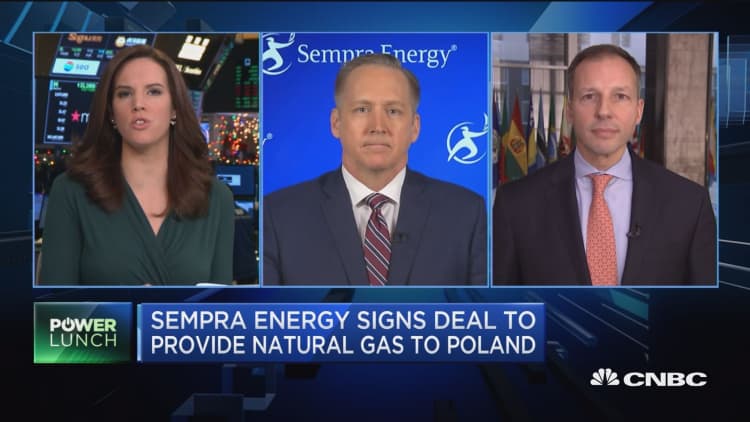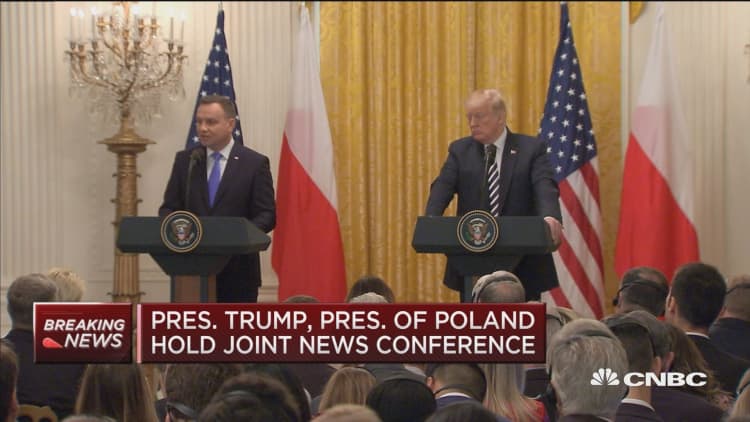Poland took another step towards weening itself off Russian energy supplies on Wednesday by signing a 20-year agreement with San Diego-based Sempra Energy to import U.S. liquefied natural gas.
The signing marks the third long-term contract the state-controlled Polish Oil and Gas Company, or PGNiG, has inked with an American LNG company this year. In the coming years, Warsaw plans to replace Russian gas with pipeline supplies from Norway and shipments of LNG, or gas super-chilled to liquid from for transport by sea.
That is opening an opportunity for the U.S. energy industry, which is on the cusp of a opening a second wave of LNG export terminals. The Trump administration, eager to dominate the global energy market, has been pitching the supplies in trade talks from Beijing to Warsaw.
Eastern and Central European nations, which have a complicated and frequently antagonistic relationship with Moscow, have been a receptive audience.
"This is a big deal," said Assistant Secretary Francis Fannon, who heads the U.S. State Department's Bureau of Energy Resources. Fannon told CNBC's "Power Lunch" that Poland is "stepping up and answering the call on energy security" for Europe.

Fannon and other Department officials were on hand on in Warsaw when Poland's PGNiG signed the deal with Sempra on Wednesday. The agreement commits PGNiG to buy 2 million tons per year from Sempra's Port Arthur Texas terminal, which is slated to enter commercial operation in 2023.
That is enough LNG to cover about 15 percent of Poland's yearly natural gas consumption, according to PGNiG. It also moves Sempra closer to making a final decision to finance the Port Arthur facility.
In October, PGNiG signed another 20-year agreement to buy 2 million tons a year from Venture Global's planned LNG export facility in Plaquemines Parish, Louisiana. In August, the Polish firm signed on for 1.45 million tons a year for two decades from Cheniere Energy, with smaller shipments starting next year.
Poland is preparing for a major shift in its energy imports after 2022, when Warsaw says it will allow a contract with Russia's Gazprom to expire. That plan also includes boosting imports from top LNG exporter Qatar and building a pipeline link with Norway.
Polish President Andrzej Duda does not hide his disdain for Poland's reliance on Russian natural gas. In a press conference with President Donald Trump in September, he said Moscow uses its grip over the European gas market for "political blackmail."
Duda is particularly opposed to the expansion of the Nord Stream pipeline system that directly links Russia and Germany. Central and Eastern European nations fear Moscow will use the new Nord Stream 2 line to bypass existing infrastructure through Ukraine, making it easier for the Kremlin to exert political pressure on its neighbors without alienating Western Europe.

Trump has also come out against Nord Stream 2, saying in July that it shows Germany is "totally controlled" by Russia.
"Nord Stream 2 is a geopolitical project of the Kremlin which is intended to sever Ukraine from the West," Fannon said on Wednesday.
By 2023, Poland expects to be importing 7.45 million tons of LNG into its Swinoujscie regasification terminal. Today, only six nations import more LNG.
Warsaw intends to export some of that gas to 12 Central and Eastern European nations in the Three Seas Initiative, which aims to bolster trade, infrastructure and energy ties throughout the region.
Beginning next year, Gazprom's contracts with several European nations come up for contract, according to a recent policy paper by Tatiana Mitrova and Tim Boersma for the Columbia University's Center on Global Energy Policy. While only Poland has signaled it will cut off Russian gas imports, the option to buy U.S. LNG could loom large over the negotiations, the experts say.
"Even very limited 'symbolic' potential U.S. LNG supply volumes to the Baltic states (as well as to Poland and maybe even Ukraine) put real pressure on Russian pipeline gas prices, and, more importantly, they are a very strong political signal," Mitrova and Boersma say.


